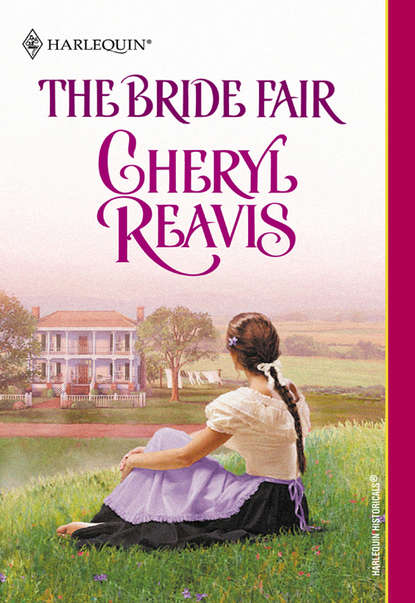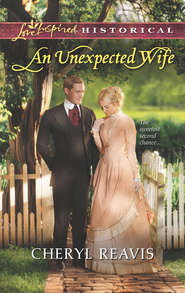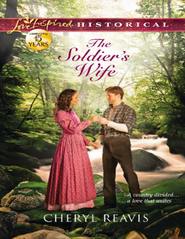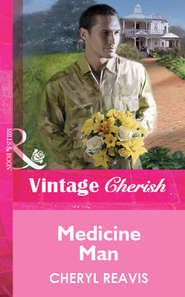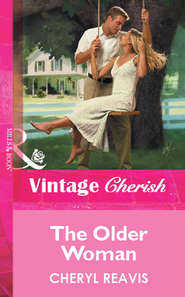По всем вопросам обращайтесь на: info@litportal.ru
(©) 2003-2024.
✖
The Bride Fair
Настройки чтения
Размер шрифта
Высота строк
Поля
“My horse is lame.”
She held the lantern higher—because he took her arm and pushed it upward.
“How did you get into the house?” she asked as he bent down to examine the horse’s foreleg and lift its hoof. But there seemed to be more of a problem with his hands than with the horse.
“My new orderly, Perkins. He’s very resourceful. I don’t imagine there is a place in this town he can’t get into if he’s of a mind. If he weren’t in the army, he’d probably be in prison. Well, the leg feels all right—no injury that I can see. It think it’s a stone bruise. Can you undo the cinch?”
She gave him an incredulous look that was wasted in the dark.
“I am not a stable boy, Colonel Woodard,” she said evenly.
“I never said you were. I have injured my hands, and I don’t think I can do it myself. I was in the cavalry, Miss Markham. Regardless of my current duties, old lessons die hard. I must see to my mount no matter what. I don’t want him to stand all night with a saddle on his back. Perkins is off on other business. You are the only other person here at the moment, and you strike me as being reasonably competent. Can we not call a brief truce on behalf of this suffering animal?”
She thrust the lantern back at him so she could undo the cinch. She even pulled the saddle and blanket off while she was at it and dumped them on the back porch.
“Anything else?” she asked.
“He needs to be fed and watered,” he said without hesitation.
“Light the way,” she said, taking the horse by the bridle and coaxing it to limp the distance to the animal shed. She stopped at the trough long enough for it to drink, then urged it into the shed and put it into an empty stall. Her buggy horse, Nell, whinnied softly in the darkness.
“The bridle,” the colonel said behind her, before she could remove it.
She gave a quiet sigh and struggled to unbuckle the bridle, then handed it to him.
“Shine the lantern there,” she said, pointing to a barrel of corn in the corner.
She lifted the lid and reached inside—as much as she hated to when she couldn’t really see where she was putting her hands. It was a carry-over from her childhood, when she once lifted out a rat along with an ear of corn.
“Thank you,” he said as she dumped as much corn as she could grab in one swipe into the stall crib.
She made no effort to acknowledge his expression of gratitude. She pitched a small clump of hay into the crib instead and turned to go. Her only interest now was in taking her “reasonably competent” self back to the house. It wasn’t for his sake that she’d assumed livery duties. She had merely appreciated his remark about a truce and determined that none of God’s creatures should suffer needlessly—regardless of who the human owner might be.
The colonel followed along after her with the lantern.
“I need my trunk opened,” he said as they entered the kitchen. He awkwardly set the lantern on the table.
“It’s in the front hall—”
“The key is in my left shirt pocket.”
She stood looking at him, trying to read the expression on his face. He wasn’t ordering her to do anything—and yet he was. And she was certain that he at least suspected that she was afraid of him. He suspected, and for some reason he was determined to push her until he could make her show it.
But she refused to be pushed. She impulsively reached into his unbuttoned tunic to find the shirt pocket with the ring of keys. This close, he smelled of smoke and horse and tobacco. He needed a shave, and he was clearly exhausted.
“Which key is it?” she asked, avoiding his eyes.
“The one in your hand. It opens the big trunk. I need two rolls of muslin and the bottle of brandy—lower left-hand side.”
She took the lantern and went into the hall. She had wanted to poke through his belongings, and apparently she was going to get the opportunity.
Except that he came with her.
She unlocked the trunk with some difficulty and located the muslin and the brandy—all the while trying to glimpse his personal possessions. A daguerreotype, a book—anything that would validate her already low opinion of the man. She saw nothing but socks and vests—and drawers. He clearly didn’t mind her rummaging through his undergarments in the least. Fortunately, she had had enough brothers not to be alarmed by the sight of normally concealed male clothing.
When she stood up, he was already on his way back to the kitchen. She sighed again and followed, carrying the brandy and the muslin.
“A glass?” he asked. “I’m apt to break things if I look myself.”
She got him one from the shelf, amazed that he expected her to pour, too, and even more amazed that she complied. Her one-handed splash was generous; the spirits didn’t belong to her.
“That’s enough,” he said, holding up an injured hand.
But he didn’t take up the glass. He shrugged off his tunic and held out his arms for her to roll up his shirt-sleeves instead. The shirt was plain but finely sewn and made of a soft, closely woven muslin like the rolls she’d gotten from the trunk. There had been nothing like it available here since before the war.
“If you would be so kind as to bind up my hands,” he said, still waiting for her to get his sleeves out of the way. “The doctor suggests you soak the bandage in cold water first.”
She hesitated, in spite of the fact that she had the skill to do what was needed. The town had had a Wayside Hospital during the war. The trains carrying the wounded had arrived at all hours of the day and night. Even though she was a young, unmarried woman of good family, she had worked around the clock more than once dressing injuries that were so terrible—
She pushed the memory aside. Binding up a soldier’s wounds was an expertise she would have preferred never to have acquired.
Colonel Woodard stood waiting. He had asked—more or less—and she couldn’t, in good Christian conscience, deny him. Whatever small kindness she would extend to a dumb animal she would also extend to him—except that a good Christian conscience had nothing to do with it. She was going to do this for her own sake, for the chance, however remote, that this Yankee might pay his rent and thereby provide her father with the funds she needed to go away.
She rolled up his shirtsleeves. At first she thought his hands must have been burned, but that was not the case. They were very badly bruised and swollen.
She took down a bowl from the china cupboard and placed the rolls of muslin in it, then carried it to the water bucket and filled it full. She could feel the colonel watching her as she worked to saturate the bandages and squeeze out the water.
“Your hands will have to be wrapped tightly to stop the swelling,” she said. “I expect it will hurt,” she added, placing the beginning strip of wet muslin across his palm.
“No matter. That’s what the brandy is for.”
She glanced up at him. He seemed to be expecting her to do just that. She immediately lowered her head and concentrated on the wrapping. She was hurting him, and she knew it. After a moment he half sat on the edge of the table, his hand still extended. She realized suddenly that it was trembling.
“How did you do this?” she asked quietly.
“Someone collected full rain barrels in a wagon and brought them to the fire. The horses shied. My hands were in the way when the load shifted. But your town doctor assures me nothing is broken,” he added. His tone suggested that he didn’t necessarily believe it. “He also said you would be very capable at wrapping them—if I could get you to do it.”
She ignored the remark and tore a split in the last few inches of the muslin, then tied the two pieces in place around the back of his hand. He held out the other one. She wrapped more swiftly now, fully aware that he was inspecting her face while she worked, no doubt verifying his earlier opinion.
“You hate us, don’t you?” he asked.
She looked at him. It was a question he hardly need ask.
“As you do us,” she said after a moment, tearing another slit in the muslin and tying it securely across the back of his hand.
“Perhaps we both have good reason.”
She had nothing to say to that and turned to go.





